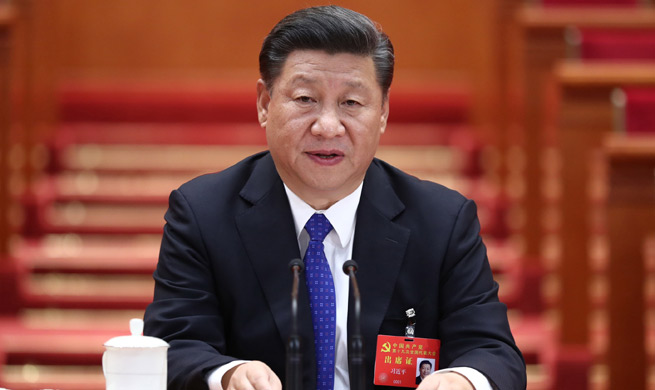by Matthew Rusling
WASHINGTON, Oct. 18 (Xinhua) -- U.S. President Donald Trump is pressing forward on tax reform, but key members of his party are squabbling over the details like chickens fighting over grain, begging the question of whether the GOP can govern.
Nine months after Trump's inauguration, Republicans are still in disarray, despite controlling both houses of Congress and the White House. Bitter rivalry among party members has caused GOP lawmakers to squander a golden opportunity to push their agenda.
Currently, Trump is pushing ahead with a major tax reform bill in a bid to repair a taxation system that many economists say is preventing the economy from fully rebounding from the 2007-2008 economic downturn.
But standing in the way are a number of GOP lawmakers. So far, they are unable to agree on the details of a budget, which they need to pass before moving on to tax reform.
One GOP lawmaker who has been vocal about his dislike for other senators is Rand Paul. The senator from the state of Kentucky on Tuesday blasted former presidential candidate and key Senator John McCain, saying he and senior Senator Lindsey Graham were both "parading" as conservatives.
"People like McCain and Graham, who parade as conservatives but are not really conservative, they need to be called out because they are bankrupting our country," Paul said on Tuesday on U.S. television station C-Span.
"The sniping between McCain and Graham and Paul reflects a fundamental schism in the GOP over the definition of conservatism and adherence to party orthodoxy," Dan Mahaffee, senior vice president and director of policy at the Center for the Study of the Presidency and Congress, told Xinhua.
"For Paul, the budget reflects a greater danger of unchecked spending and greater deficits, rather than policy goals," Mahaffee said.
"I think the GOP will end up reaching a budget agreement, as a starting point, because they know they need to achieve some of their legislative objectives before the 2018 midterms. That said, agreeing to the broad strokes of the budget is far easier than the more complex task of putting together a tax package," Mahaffee said.
Brookings Institution senior fellow Darrell West told Xinhua that "Paul wants to reduce the budget deficit and is frustrated that his fellow Republicans are not joining him on this crusade."
"He believes (Trump's) tax cut will explode the deficit unless it is accompanied by major budget cuts that are not part of the package. He has signaled his intention to oppose the tax cut if it increases the deficit," West said.
Indeed, Paul has gained much media attention over the years for his concern over the U.S. debt, which surpassed 20 trillion U.S. dollars last month.
"Republicans long have been the party fighting budget deficits, but most of the party is turning a blind eye towards that topic now," West said.
"They are more interested in cutting taxes than keeping the deficit down. It remains to be seen how they reconcile those competing principles. Unless they can keep all the other deficit hawks on board, they will have a tough time with the tax bill," West said.
Meanwhile, Trump is pushing ahead with plans to pass a tax overhaul. In a speech Tuesday night at the conservative Heritage Foundation, a think tank in Washington, the president said that at the heart of his tax reform are "everyday, working Americans."
Trump highlighted that he needed the full support of Republicans in Congress, in order to garner enough votes to pass the bill, but added that the legislation would be "the largest tax cut in the history of our country."
Under the current taxation system, U.S. corporations are often taxed twice, once in the United States and again in most countries in which they operate. Supporters of a corporate tax cut argue that it would boost U.S. companies' global competitiveness.
Corporations also say this will help them hire in the United States. Critics of Trump's tax plan say it is a tax break for the wealthy.
Just a few months back, Trump tried to pass a major bill to repeal and replace the nation's controversial healthcare system, known as Obamacare, which was implemented under the previous administration.
But Republicans failed to unite behind the bill, with a key GOP lawmaker refusing to support the legislation. Ultimately the bill failed to pass. If this continues, the GOP will lose credibility in the lead-up to the 2018 Congressional elections, experts said.

















